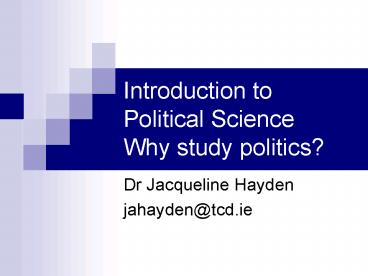Introduction to Political Science Why study politics - PowerPoint PPT Presentation
1 / 19
Title:
Introduction to Political Science Why study politics
Description:
Gun lobby. 11. 8/22/09. Partiality of judgement. Valuing Equality. Communism/Marxism. Values of equality and social co-operation are stressed as opposed to individual ... – PowerPoint PPT presentation
Number of Views:945
Avg rating:3.0/5.0
Title: Introduction to Political Science Why study politics
1
Introduction to Political ScienceWhy study
politics?
- Dr Jacqueline Hayden
- jahayden_at_tcd.ie
2
Your Tutorial Team
- Head Teaching Assistant
- Caroline McEvoy mcevoyc1_at_tcd.ie
- Ulla Dawidowska dawidou_at_tcd.ie
- Mirjam Allik allikm_at_tcd.ie
- Carolina Plescia plesciac_at_tcd.ie
- Michael Courtney courtnmj_at_tcd.ie
- Edmond Coughlan coughlae_at_tcd.ie
- Madgalena Staniek staniekm_at_tcd.ie
3
(No Transcript)
4
(No Transcript)
5
(No Transcript)
6
(No Transcript)
7
Politics Matters!
- Political decisions made on our behalf affect all
our lives even if we didnt vote - Policy Outcomes
- Health private or public?
- Backing the bankers
- Educational priorities special needs?
- Dealing with drug abuse
- Taxation policy
8
Politics and power
- From the moment of birth part of a political
entity the family! - Most often families are patriarchal
- The availability of schools determined by
political choices made by government on behalf of
the people - Your educational agenda is set for you
- The ideas and influences you are exposed to
determines who you become
9
Politics and the power of theory
- Political outcomes our world determined by
political decisions informed by theories and
philosophies - Try to understand how different theories of the
role of the state, the function of government and
the conflicting rights of individuals versus
community shape the world as we experience it - The questions What is the good life?, What is
the state for?, How much power should the state
have over me? AND MORE!
10
So why does politics matter?
- Politics exists because we do not agree with one
another. Politics is about choosing between
competing interests and views often demanding
incompatible allocations of limited resources
(Stoker, p. 2) . - Human nature lies at the heart of why politics is
central to living together - Human beings have different often conflicting
interests - But to resolve problems we need to engage in
collective action - Politics expresses conflicts between us it
allows different interests to come together and
shapes what happens to us collectively
11
Politics and collective action
- Starting point for decision making is our own
individual experience partiality of judgement - People value things differently
- Central question What is the good life?
- Answer determines your political outlook
12
Partiality of judgement
- Huge differences over centuries What is the
good life? - Liberty/Freedom versus Equality?
- Two concepts of liberty negative and positive
- Negative freedom/liberty
- Political system should only infringe an
individuals freedom when it prevents actions
that may hurt others - Basis of English social thought from Hobbes and
Locke - Positive freedom/liberty capacity for
self-realization and development - Distinction between negative and positive freedom
understood as the difference between being free
from something and being free to do something (I.
Berlin1958)
13
Equality
- Equal consideration within a scheme of
decision-making - for each person within a scheme
of decision-making everyones claim to equal
treatment should be taken equally into account - Even handed treatment like be treated with like
- Equality in distribution equal treatment
requires that each person receive an equal amount
of a good - Equality in outcome
- The claim that equal treatment requires that
persons should end up in the same conditions,
taking account of their situation, before
distribution and adjusting the amount to be
distributed to each accordingly
14
Valuing negative freedom/liberty
- Liberalism
- Liberal economics/ Market capitalism
- Thatchers Britain Reagan/Bush Administrations
in the US - Libertarianism
- all people have a certain set of rights which
cannot be taken away or annulled in the interest
of the collective. - Certain versions of Republicanism (US)
- Gun lobby
15
Partiality of judgement
- Valuing Equality
- Communism/Marxism
- Values of equality and social co-operation are
stressed as opposed to individual self-seeking or
betterment. - Socialism
- From each according to his abilities, to each
according to his needs (Louis Blanc, The
Organization of Work 1840) - Social democracy
- Social justice
- Nationalized key utilities
- Welfare state supported by higher and
proportional - taxation policies
16
Politics and the defence of interests
- Politics defined by some as
- Who gets what, when, how? (H. Lasswell)
- Getting a slice of the cake or hanging on to
ones bit of the cake - Politics centres on the allocation of SCARCE
RESOURCES
17
Interest, arbitration and collective action
- Identity and entitlements
- The political agenda changes over a persons life
cycle - Much of politics is concerned with collective
decisions about - Redistribution
- The costs of Redistributive Polices are passed
onto society - Society does not always want to pay the costs of
redistribution clashes of interests - Politics is the attempt to resolve collective
action problems
18
In Defence of PoliticsBernard Crick
- Politics is simply the activity by which
government is made possible when differing
interests in an area to be governed grow powerful
enough to need to be conciliatedOther paths are
always open. Politics is simplythat solution to
the problem of order which chooses conciliation
rather than violence and coercion, and chooses it
as an effective way by which varying interests
can discover that level of compromise best suited
to their common survival.(5th ed,Continuum2000)
19
Reading
- Andrew Heywood, 3rd Edition, Politics p. 3-13
- Gerry Stoker, Why Politics Matters Introduction
- Reference in lecture to
- Isaiah Berlin, 1958, Four Essay on Liberty
- Noam Chomsky article Irish Times October 10th
2009 - http//www.irishtimes.com/newspaper/opinion/2008/
1010/1223560345968.html































